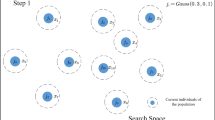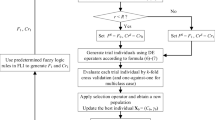Abstract
Generalization performance of support vector machines (SVM) with Gaussian kernel is influenced by its model parameters, both the error penalty parameter and the Gaussian kernel parameter. The differential evolution (DE) algorithms have strong search ability and easy to implement. But it falls into local optimum easily. Hence a novel differential evolution algorithm which integrating opposition-based learning and hybrid competition between adjacent two generations is put forward for parameter selection of SVM (DGODE-SVM). In DGODE-SVM algorithm, opposition-based learning and hybrid competition between adjacent two generations are inserted into the differential evolution process. Nineteen experimental results on UCI datasets distinctly show that, compared with ODE-SVM, SaDE-SVM, DE-SVM, SVM, C4.5, KNN and NB algorithms, the proposed algorithm has higher classification accuracy.


Similar content being viewed by others
References
Angelov P, Kasabov N (2005) Evolving computational intelligence systems. In: Proceedings 1st international workshop on genetic fuzzy systems, 2005, pp 76–82
Angelov P, Kasabov N (2006) Evolving intelligent systems, eIS. IEEE SMC eNewsLetter 15:1–13
Baruah RD et al (2013) DEC: dynamically evolving clustering and its application to structure identification of evolving fuzzy models. IEEE Trans Cybern 44(9):1619–1631
Brest J, Greiner S, Boskovic B et al (2006) Self-adapting control parameters in differential evolution: a comparative study on numerical benchmark problems. IEEE Trans Evol Comput 10(6):646–657
Chunhong Z, Licheng J (2004) Automatic parameters selection for SVM based on GA. In: Proceedings of the 5th world congress on intelligent control and automation. Piscataway, NJ: IEEE Press, 2004, pp 869–1872
Hettich S, Blake C, Merz C (1998) UCI repository of machine learning databases. In: Department of Information and Computer Science, University of California, Irvine, CA. www.ics.uci.edu/~mlean/MLRepository.html. Accessed 15 Aug 2014
Hsu C, Chang C, Lin C et al (2003) A practical guide to support vector classification. In: Technical report, Department of Computer Science and Information Engineering, National Taiwan University, Taipei, 2003, pp 1–12
Jiang L, Xie D (2018) An efficient differential memetic algorithm for clustering problem. IAENG Int J Comput Sci 45(1):118–129
Jun L, Lixin D, Qilin Z (2013) A novel optimization algorithm integrating immunity clone and differential evolution for parameter selection of SVM. Inf Technol J 12(23):7367–7372
Leon M, Xiong N (2017) Alopex-based mutation strategy in differential evolution. In: 2017 IEEE Congress on evolutionary computation (CEC). San Sebastian, Spain, July 2017, pp 1978–1984
Li J, Li B (2014) Parameters selection for support vector machine based on particle swarm optimization. Intelligent computing theory. Springer International Publishing, New York, pp 374–382
Li J, Zou J, Li B et al (2018) A differential evolution algorithm using multi-neighborhood strategy and neighborhood centroid opposition-based learning. J Wuhan Univ Sci Technol 41(3):232–240
Piotrowski AP (2013) Adaptive memetic differential evolution with global and local neighborhood-based mutation operators. Inf Sci 241(12):164–194
Rahnamayan S, Tizhoosh HR, Salama MMA (2008) Opposition-based differential evolution. IEEE Trans Evol Comput 12(1):64–79
Wang H (2011) Research on intelligent algorithms for region transform search. Wuhan University, Wuhan
Wang H, Wu Z, Rahnamayan S (2011) Enhanced opposition-based differential evolution for solving high-dimensional continuous optimization problems. Soft Comput 15(11):2127–2140
Wang BC, Li HX, Li JP et al (2018) Composite differential evolution for constrained evolutionary optimization. IEEE Trans Syst Man Cybern Syst 99:1–14
Xia Y, Li J, Zhou H et al (2019) Optimized ant colony algorithm for continuous domains based on across neighborhood search. J Wuhan Univ Sci Technol 42(3):212–219
Zhang J, Sanderson AC (2009) JADE: adaptive differential evolution with optional external archive. IEEE Trans Evol Comput 13(5):945–958
Zhang C, Ning J, Lu S et al (2009) A novel hybrid differential evolution and particle swarm optimization algorithm for unconstrained optimization. Oper Res Lett 37(2):117–122
Zhang B, Yanhui LI, Guo H (2017) Cross-population differential evolution algorithm based on opposition-based learning. J Comput Appl 37(4):1093–1099
Zhao M, Ren J, Ji L et al (2012) Parameter selection of support vector machines and genetic algorithm based on change area search. Neural Comput Appl 21(1):1–8
Funding
The funding was received by National Natural Science Foundation of China Grant no. (61572381) and Hubei Province Key Laboratory of Intelligent Information Processing and Real-time Industrial System (Wuhan University of Science and Technology) Grant no. (znxx2018QN06).
Author information
Authors and Affiliations
Corresponding author
Additional information
Publisher's Note
Springer Nature remains neutral with regard to jurisdictional claims in published maps and institutional affiliations.
Rights and permissions
About this article
Cite this article
Li, J., Fang, G. A novel differential evolution algorithm integrating opposition-based learning and adjacent two generations hybrid competition for parameter selection of SVM. Evolving Systems 12, 207–215 (2021). https://doi.org/10.1007/s12530-019-09313-5
Received:
Accepted:
Published:
Issue Date:
DOI: https://doi.org/10.1007/s12530-019-09313-5




